MEATing the Moment: Valley Vision Attends 3rd Regenerative Meat Summit
By Grace Kaufman & Ethan Mermell
On November 18th, Trish Kelly, Grace Kaufman, and Ethan Mermell of Valley Vision’s Food and Agriculture team attended the 3rd California Regional Regenerative Meat Event hosted by Roots of Change, UC Davis Institute of the Environment, and IC-FOODS, in collaboration with Mulvaney’s B&L and Cream Co. This event was a celebration of three-years of USDA-funded work to develop high-value regional meat supply chains in Northern California. As the lead for coordination and communication for USDA’s Southwest Regional Food Business Center, Valley Vision has participated in this effort to learn about supply chain and market challenges and opportunities for regenerative ranchers in California and support the project through a variety of ways. This includes facilitating connections with several of our food and agriculture partners who work across the region and throughout the state; sharing information about the resources of the Center and the state-funded California Jobs First Initiative which Valley Vision manages for the region – We Prosper Together; and coordinating on institutional procurement activities led by the University of California and the California Dept. of Food and Agriculture (CDFA).
The event kicked off with a panel discussion about the launch of the University of California Market, emphasizing the outcomes of launching system-wide purchasing of regional and regenerative meat for the UC system’s schools and hospitals. Marilyn Biscotti, UC Office of President; Clifford Pollard, Cream Co Meats, and Kathy Webster, TomKat Ranch and Beef2Institution Collaborative spoke on their experiences procuring regenerative meat in University and K-12 school districts. Major barriers include long-term contracts to meet demand of conventional food suppliers, processing and aggregation, as well as market channels for whole animal usage. As an aggregation and distribution hub for ranchers throughout the state, Cream Co Meats provides the “missing middle” in supply chain infrastructure for institutional procurement. Cream Co Meats has purchased 1.3 million pounds of regenerative, West Coast meat from ranchers in the past year, and plans to procure an additional 30 percent annually, serving as an aggregator for resale to institutions. The panel ended with an exciting announcement – starting in 2025, the University of California will purchase 400,000 pounds of regenerative meat from Cream Co Meats.
Following a delicious lunch of local produce and regenerative meat from PT Ranch, Sarah Keiser, Wild Oat Hollow, Jim Kleinschmit, Other Half Processing and Growing GRASS, Nick Anicich, CDFA Farm to School, and Steve Schwartz, Interfaith Sustainable Food Collaborative, spoke of new market opportunities for regenerative growers. Steve Schwartz’s presentation highlighted new policies such as AB 888 that support on-farm harvesting for cultural practices. Nick shared a list of CDFA’s funding opportunities and encouraged ranchers to get involved in farm to school and institutional procurement. Sarah discussed the market opportunities, and ecosystem services that cows, sheep, and goats provide through fire management grazing. Jim discussed new market opportunities for ranchers, such as regenerative leather products.
IC Foods then presented a demo on their Regional Regenerative Meat Resource Portal which provides a directory of the regional regenerative meat community, such as contact information and resources on markets and opportunities.
The last panel of the event focused on remaining challenges and solutions for regenerative meat. This panel’s speakers, Michael Delbar, CA Rangeland Trust and Loren Poncia, Stemple Creek Ranch discussed marketing and how the community’s awareness of regeneratively grown meat is growing. Challenges discussed included the dwindling amount of processors and the need to increase producer awareness of available grants, as economic feasibility persists as a challenge across the board faced by ranchers. It is important for these businesses to be viable given that regenerative grazing differs from conventional meat production through practices that improve soil structure and build soil organic matter, leading to carbon sequestration.
Jenny Lester Moffitt, USDA Under Secretary for Marketing and Regulatory Programs, discussed a broad range of funding opportunities from USDA and new initiatives that support small and mid-sized farmers and ranchers, such as the USDA Regional Food Business Centers- 12 multi-state centers across the country providing new resources to support farmers, ranchers and food producers and more resilient regional food systems. As part of this effort, USDA has hired 40 fellows to support food system transformation, including programs to support regenerative agriculture. Jenny noted that supply chain infrastructure such as processing facilities are a major challenge for small to mid sized ranchers. As part of Valley Vision’s role in the USDA Southwest Regional Food Business Center, we actively share information about upcoming funding opportunities and resources for supply chain infrastructure and new market channels, and the Center’s network of partners provide capacity building support to access these resources. We also include the Regional Regenerative Meat Portal in Center resources.
The event ended with CDFA Secretary Karen Ross, who provided an optimistic and forward-looking view of regenerative agriculture in California. Secretary Ross discussed the future of regenerative agriculture, which planted the seed for creative networking discussions that were paired with regenerative meats, including goat from Neuman Family Ranch, and local, seasonal produce prepared by Chef Mulvaney and staff.
To learn more about Roots Of Change and the regenerative meat project, visit: https://www.rootsofchange.org/projects/transformation-of-californias-meat-processing-capacity/
To learn more about the USDA Southwest Regional Food Business Center, visit www.swfoodbiz.org and sign up for the newsletter here: http://bit.ly/SWRFBC-Newsletter
Community Innovator, We Prosper Together, Shares Strategies Primed to Increase Economic Growth in the Capital Region

The Regional Plan: Strategies for a Thriving and Inclusive Economy charts a bold path to a more resilient, inclusive, and prosperous future
SACRAMENTO, CA — October 28, 2024 — We Prosper Together unveiled its Regional Plan: Strategies for a Thriving and Inclusive Economy, a community-driven framework providing the blueprint for a more resilient, sustainable, and equitable economy for the Capital Region. This strategic plan—the result of a two-year-long collaboration—identifies key priorities that will shape future investments, including those supported by We Prosper Together through California’s Regional Investment Initiative.
“The completion of We Prosper Together’s Regional Plan is another step towards building an equitable and sustainable regional economy,” said Evan Schmidt, Chief Executive Officer of Valley Vision. “Shaped by economic research and input from communities across our region, this economic framework will create more quality jobs by helping to move innovative ideas to fruition, bring projects to life, and accelerate the region toward a future where all families can thrive.”
The Regional Plan outlines actionable strategies to achieve more high-quality jobs, lower barriers to access, and foster more equitable outcomes for local families. The plan identifies two primary strategies:
- Target Sector Strategies: Strategies focusing on investments in four high-growth sectors with the greatest potential for quality job creation. These sectors include Business Services, Precision Manufacturing, Working Lands, and Research & Development.
- Economic Mobility Strategies: Approaches connecting disinvested communities with existing high-quality job opportunities ensuring future economic growth results in equitable outcomes for the region’s residents. These approaches include workforce development, outreach and awareness, transportation, childcare, and housing.
Developed through robust community feedback, stakeholder interviews, surveys, and comprehensive research conducted by Brookings Institute-affiliated Cities GPS, the Regional Plan takes into account the distinct needs, strengths, and opportunities across the region to create a collective vision for the future.
“The Regional Plan not only exemplifies the strength and opportunity of cross-regional collaboration but also sets us up to make targeted investments that can transform our region,” said James Corless, Executive Director of the Sacramento Area Council of Governments. “Only by coming together can we create a local economy that works for everyone and ensures all have access to the resources they need to prosper.”
The Regional Plan: Strategies for a Thriving and Inclusive Economy serves as a unifying roadmap cultivating a resilient, sustainable, and equitable economy empowering all local residents. The Regional Plan builds upon July 2023’s Capital Region Economic Assessment, a holistic assessment of the Capital Region’s economic, climate, and public health as part of the California Jobs First program. The Regional Plan concludes a two-year planning phase that included establishing We Prosper Together’s Collaborative, extensive community engagement, and the development of a shared regional strategy. We Prosper Together will now transition from planning to implementation, leveraging existing strategies and subregional efforts to drive progress.
The full Regional Plan can be found at https://www.weprospertogether.org/our-regional-plan.
The Global Shapers Sacramento Hub Aims to Erase Millions of Dollars in Medical Debt Through “Shred the Debt” Campaign
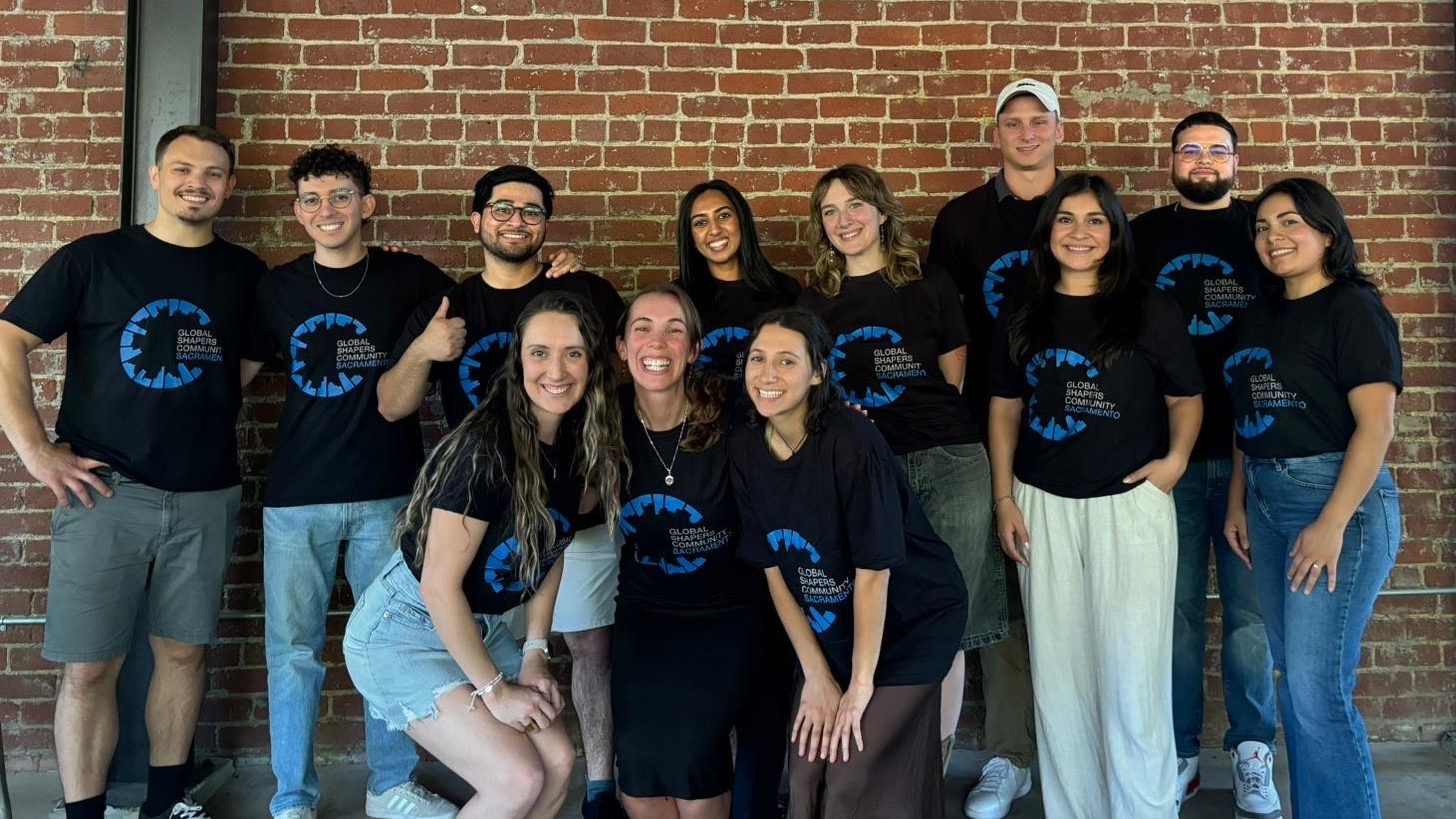
This Youth-led Effort Aims to Eliminate Medical Debt for Thousands of Residents in the Greater Sacramento Region for Pennies on the Dollar
Sacramento, California November 4th – Today, The Global Shapers Sacramento Hub announces the launch of Shred the Debt, a project aimed at erasing medical debt across the Greater Sacramento Region. Through this initiative, the Global Shapers Sacramento Hub aims to purchase and eliminate millions of dollars in medical debt, focusing on those disproportionately burdened by medical debt.
“Our goal is to alleviate some of the financial stress that medical debt imposes on our neighbors,” said Gustavo Garcia, Curator of the Global Shapers Sacramento Hub. “Through Shred the Debt, we’re not just erasing numbers on a balance sheet—we’re giving people a fresh start and lifting a heavy burden that affects health, families, and futures. We have an ambitious goal to buy a medical debt portfolio worth $3.7 million, and are confident that our region will come together to tackle this.”
Shred the Debt is made possible through a partnership with Undue Medical Debt, which specializes in purchasing medical debt at a fraction of its original cost. Through this partnership, a donation of just $1 has the power to erase over $200 of medical debt, amplifying the impact of each contribution.
The Global Shapers Sacramento Hub will be collecting donations through the middle of February, and will match the first $500 donated – eliminating over $100,000 worth of medical debt for our neighbors, families, and communities in the Greater Sacramento Region. For more information, and to sponsor our efforts, please contact David Sievers at sacramento@globalshapers.org.
For more information on how our project works or to make a donation, please visit our donation page.
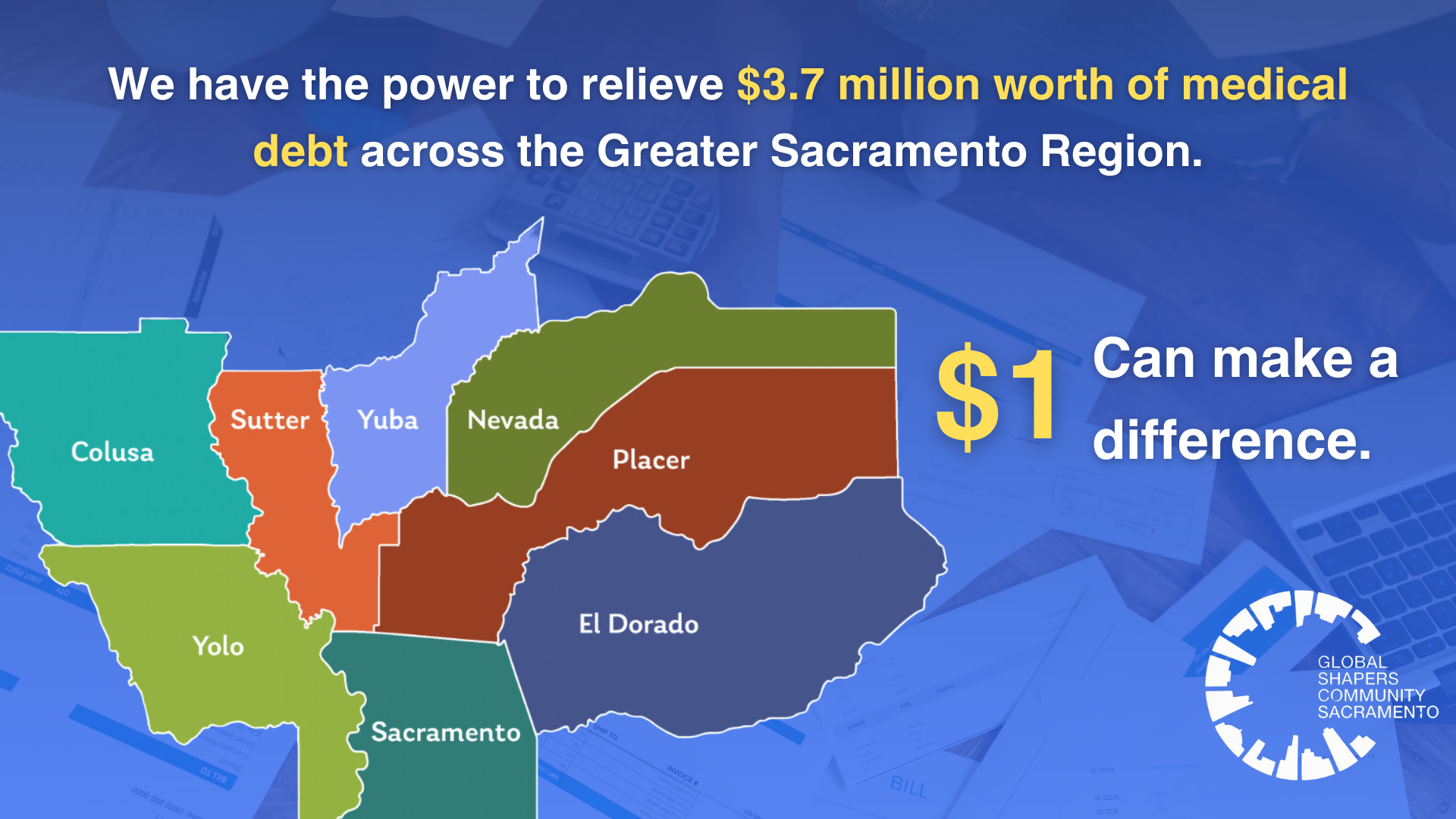
Valley Vision has been fiscal agent for the Global Shapers – Sacramento Hub for several years. Through this formal partnership, the Sacramento Hub has access to a high-performing and trusted local nonprofit that manages its finances and records, keeping things running smoothly. For Valley Vision, the Global Shapers bring a unique connection to the global community not found in other young leaders groups, which further boosts VV’s toolset in advancing the livability of the Sacramento region.
City of Sacramento Passes Digital Inclusion Week Resolution
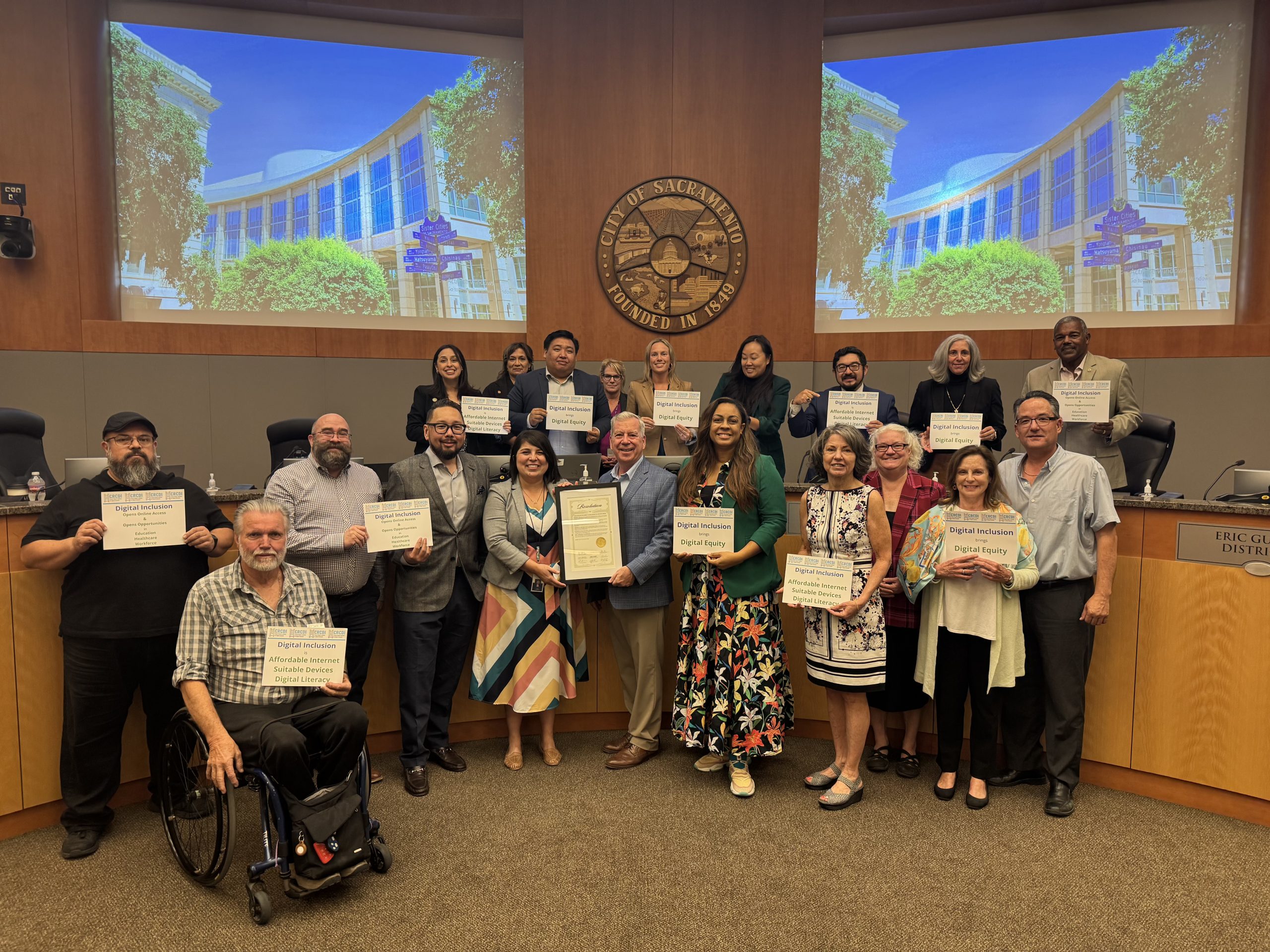
In early October, Valley Vision joined organizations across the nation to celebrate Digital Inclusion Week, an annual recognition week designed to advocate the importance of achieving digital equity for communities, celebrate digital inclusion achievements, and elevate local digital inclusion practices.
This year’s theme, “Stronger Together: Mobilizing Towards Sustainability,” emphasizes the importance of recognizing sustainability in partnerships and resources throughout the digital inclusion process in order to create a lasting impact towards digital equity.
Digital Inclusion Week Action
In support of this theme, Valley Vision, through the Capital Region Coalition for Digital Inclusion (CRCDI), conducted outreach support for Computers4Kids’ computer donation drive, in order to help connect with businesses and individuals in the region to donate their used devices in order to be refurbished.
The drive consisted of both a business outreach portion as well as a donation event at the Teen Center in West Sacramento on October 9th. Through business outreach, Computers4Kids secured a Computer Donation Partner arrangement with Quick Quack Car Wash. Quick Quack Car Wash provided several used desktop computers for the event, and committed to donating regularly in the future.
City of Sacramento Presents Digital Inclusion Week Resolution
On October 22nd, Valley Vision attended Sacramento City Council to accept the city’s Resolution acknowledging Digital Inclusion Week, presented by Councilmember Katie Valenzuela. The Resolution, developed in partnership with CRCDI, recognizes the longstanding commitment of CRCDI and its partner organizations in delivering digital inclusion support and services across the region, in order to bridge the digital divide.
Valley Vision was joined by partners across the region, including California State University, Sacramento, Computers4Kids, Sacramento Public Library, Sagent Marketing, United Way Connected Capital Region, and World Education. Kevin Flash, CRCDI Chair, and Dawnte Early, CEO of United Way California Capital Region and Valley Vision Board Member provided public comment during the presentation, highlighting the importance of continued partnerships in digital inclusion efforts and recognizing the city’s ongoing commitment to digital equity.
Valley Vision is thankful to the City of Sacramento for its longstanding commitment to supporting digital inclusion activities in the region, as well as leading recognition of Digital Inclusion Week within the Greater Sacramento Region. In October 2019, the City of Sacramento was the first within the region to pass this resolution, formally launching National Digital Inclusion Week in the region.
Digital Inclusion Week 2023
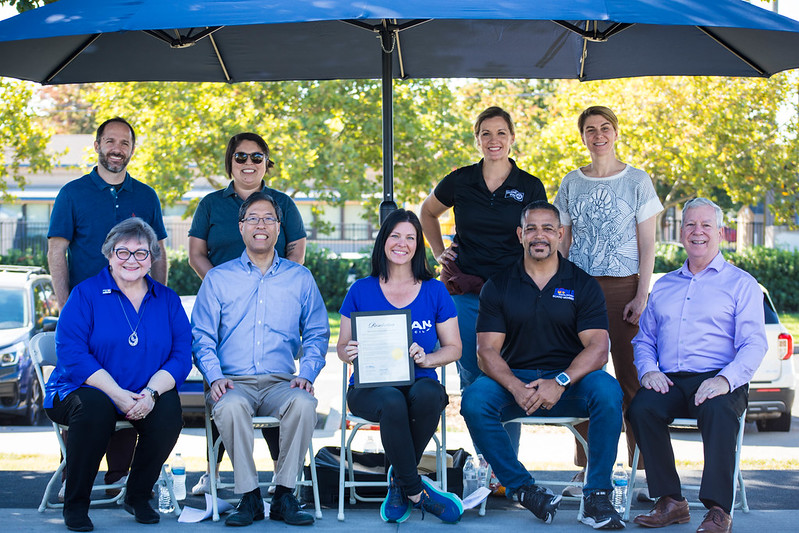
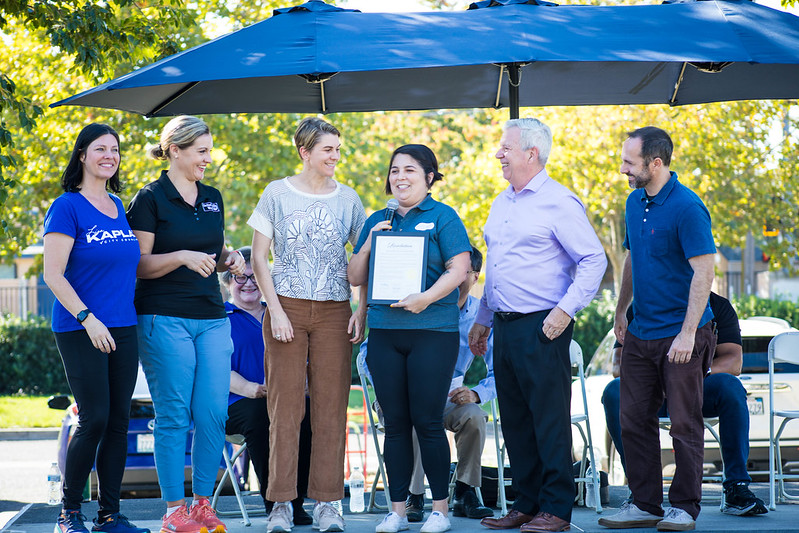
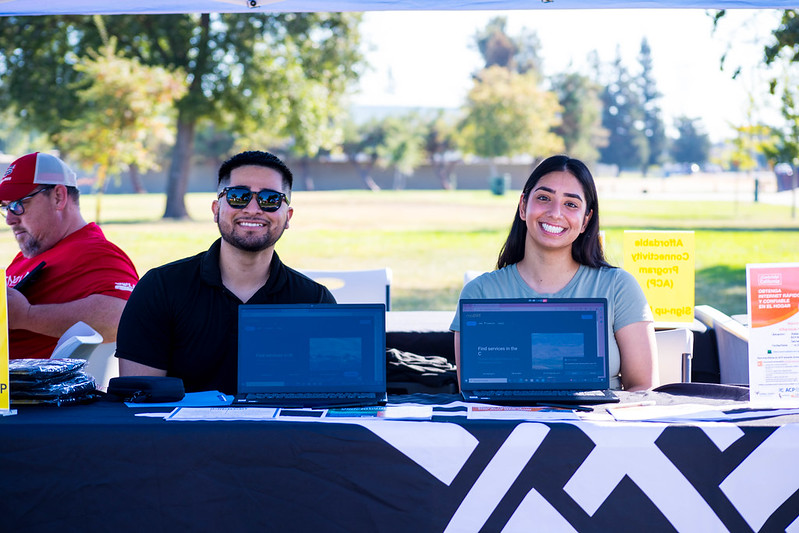
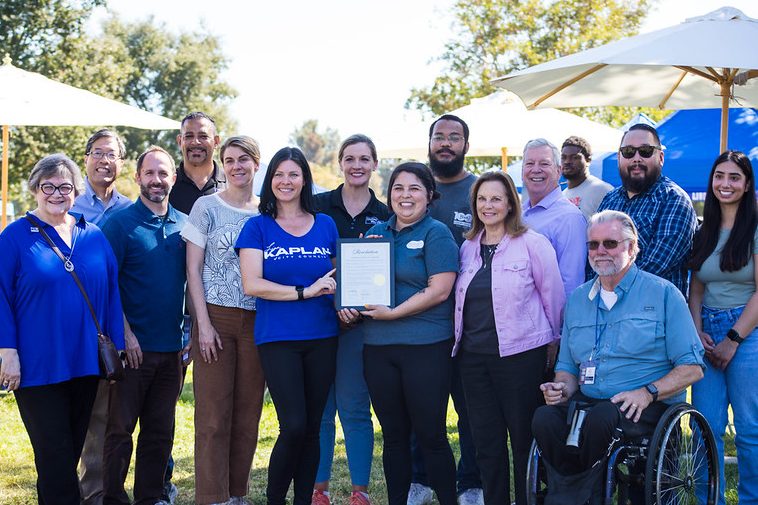
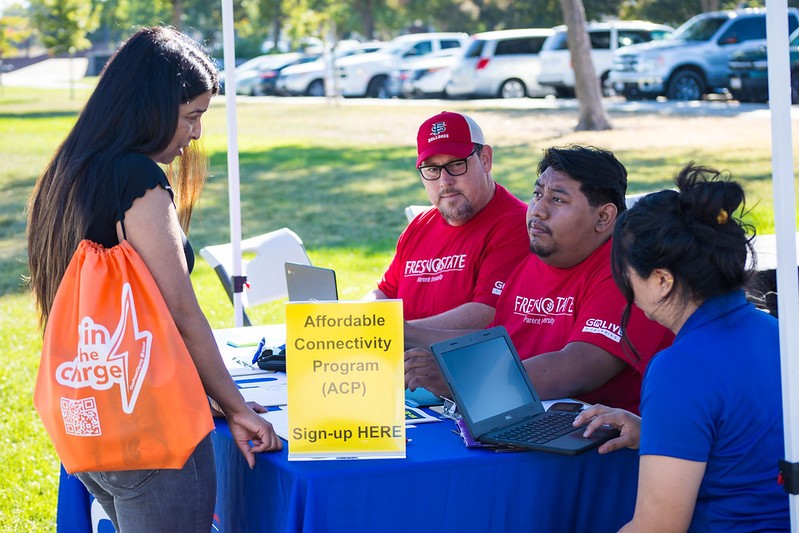
In support of 2023’s theme, “Building Connected Communities,” Valley Vision, as manager of the Capital Region Coalition for Digital Inclusion (CRCDI), hosted an Affordable Connectivity Program (ACP) enrollment site at the Robla Family Festival on October 7th. As a result of the Coalition’s efforts, 50 households received the opportunity to inquire about or sign-up for ACP. Following the enrollment event, 4 households which signed-up for ACP were selected to receive a free laptop device.
As a part of CRCDI’s efforts for Digital Inclusion Week, Sacramento City Councilmembers Katie Valenzuela and Lisa Kaplan attended the Robla Family Festival to present the city’s Resolution acknowledging Digital Inclusion Week to Valley Vision, CRCDI, and United Way Connected Capital Region.
Event Recap – Farm-to-School Partnerships: Expanding Market Opportunities for Farmers and Food Producers
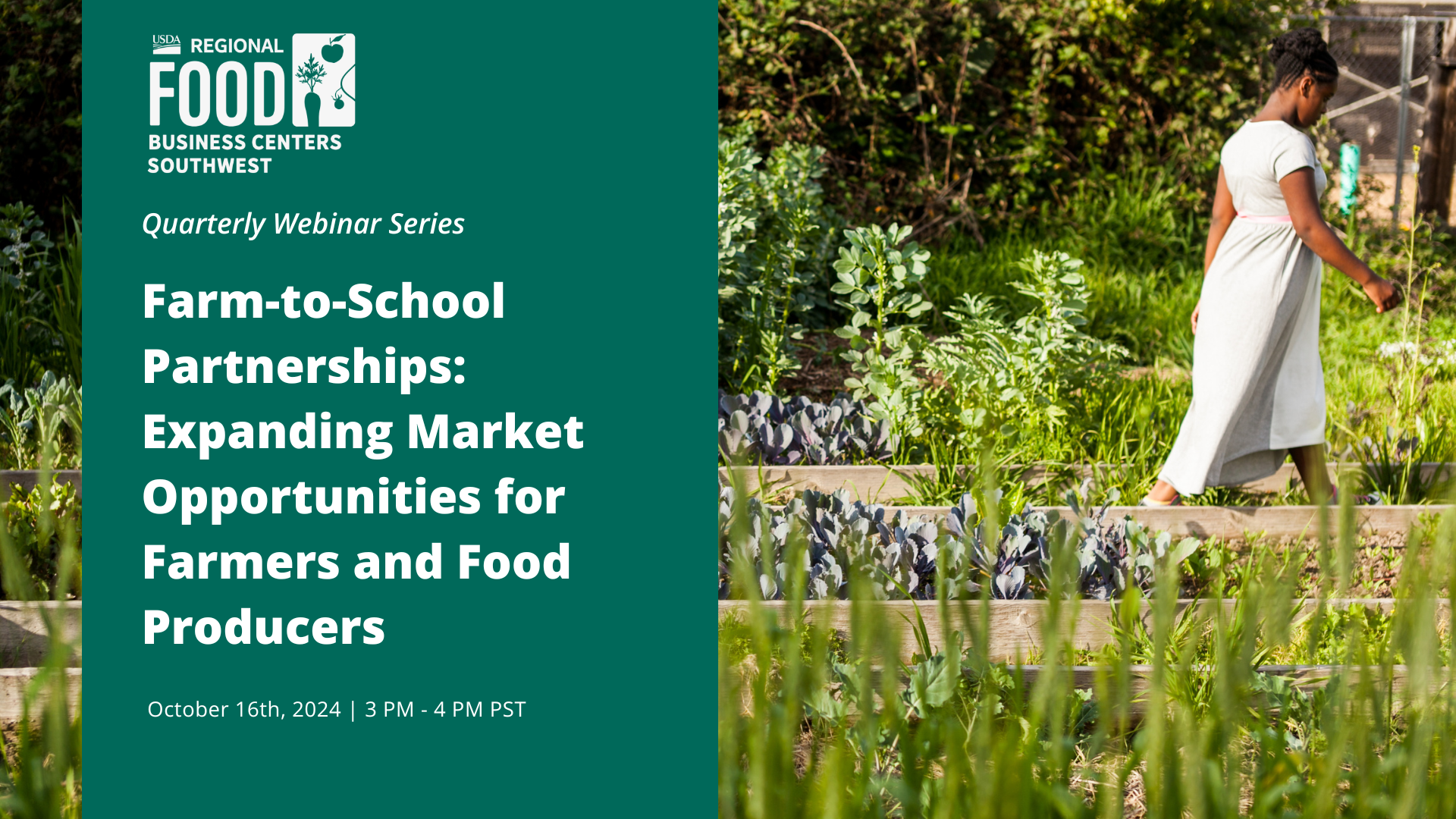
On October 16th, the USDA Southwest Regional Food Business Center held its second webinar as part of its quarterly series. The webinar, “Farm-to-School Partnerships: Expanding Market Opportunities for Farmers and Food Producers,” featured speakers from Utah Department of Agriculture and Food, California Alliance with Family Farmers (CAFF), and USDA Food and Nutrition Service (USDA FNS). Speakers provided insights into farm to school programs and initiatives taking place across regional, state, and national levels.
Highlighted programs and initiatives include:
- Movement Building Workshops led by Utah Farm to Fork, to help interested farmers, ranchers, and producers connect to their region network and gain resources and training related to participating in farm to school;
- Direct service assistance for procurement and conducting statewide events such as the California Crunch Day led by CAFF, who has been supporting and leading Farm to school programs for 20 years; and
- The USDA FNS Patrick Leahy Farm to School Program, which aims to assists child nutrition program operators incorporate local foods through grant funding, technical assistance, training, and more.
Register for the Southwest Center’s Upcoming Webinar
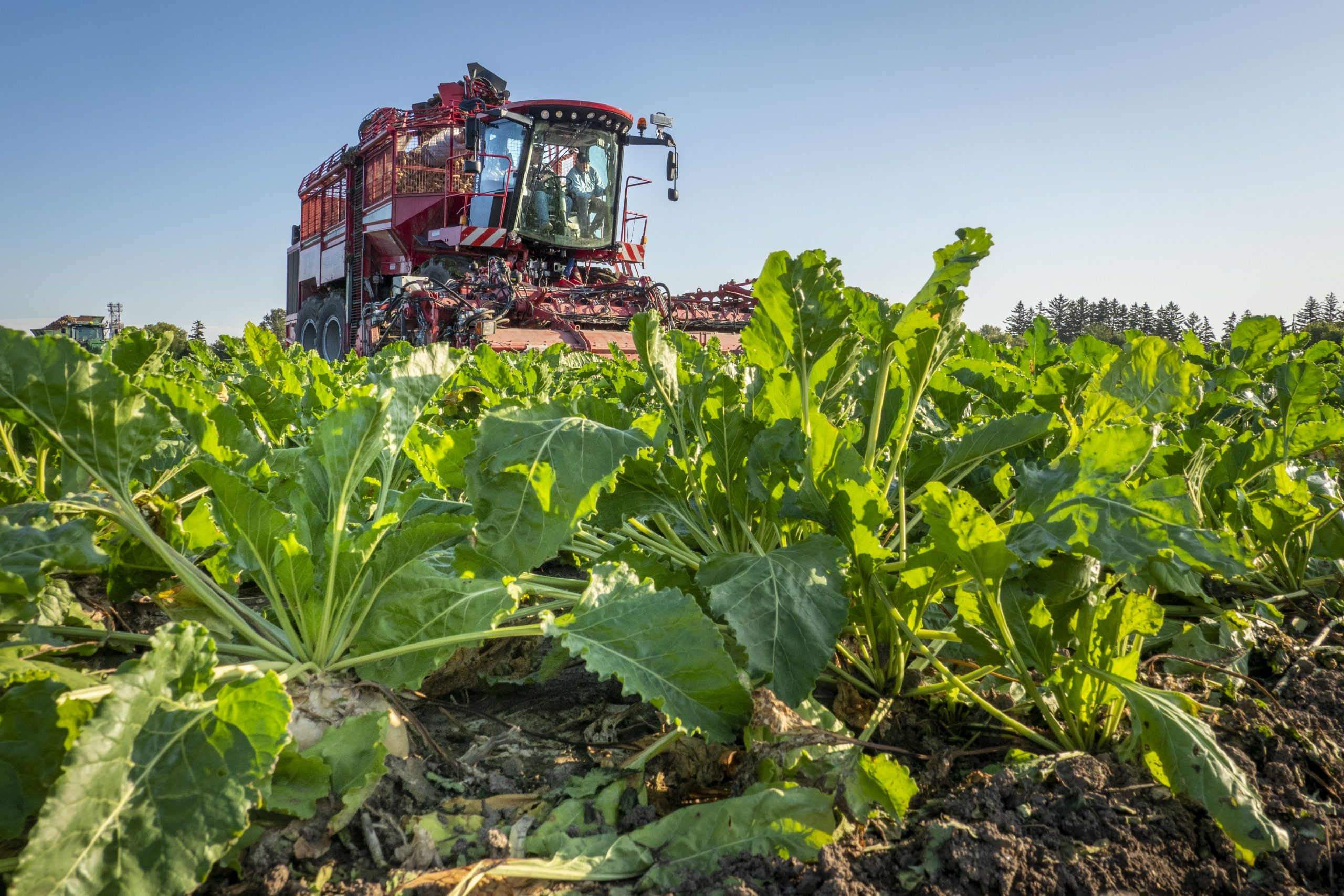
Join the USDA Southwest Regional Food Business Center on January 15th from 3-4PM PST for our third webinar focused on institutional procurement.
About Valley Vision and the Southwest Regional Food Business Center
Valley Vision leads coordination, communication, and network development efforts for the Southwest Regional Food Business Center. The quarterly webinar series is part of Valley Vision’s efforts to share best practices and to foster a collaborative network among Center partners and other participants.
The Southwest Regional Food Business Center, representing Arizona, California, Nevada, and Utah, is one of twelve USDA Regional Food Business Centers nationwide developed in 2023 to provide coordination, technical assistance, and capacity building to help farmers, ranchers, and other food businesses access new markets and initiatives, as well as navigate federal, state and local funding and resources. With an extensive network of partners from academic, government, and community-based organizations, the Southwest RFBC is dedicated to prioritizing historically underrepresented communities and small to mid-tier businesses.
For more information about the USDA Southwest Regional Food Business Center and its initiatives, visit www.swfoodbiz.org. To stay updated on future webinars and events, be sure to subscribe to the Center’s newsletter: http://bit.ly/SWRFBC-Newsletter.
USDA disclosures and guidance can be found at https://bit.ly/USDAdisclosures.
Visit the Center’s socials here.
Valley Vision Helps Showcase Sacramento As Co-Host of California Economic Summit
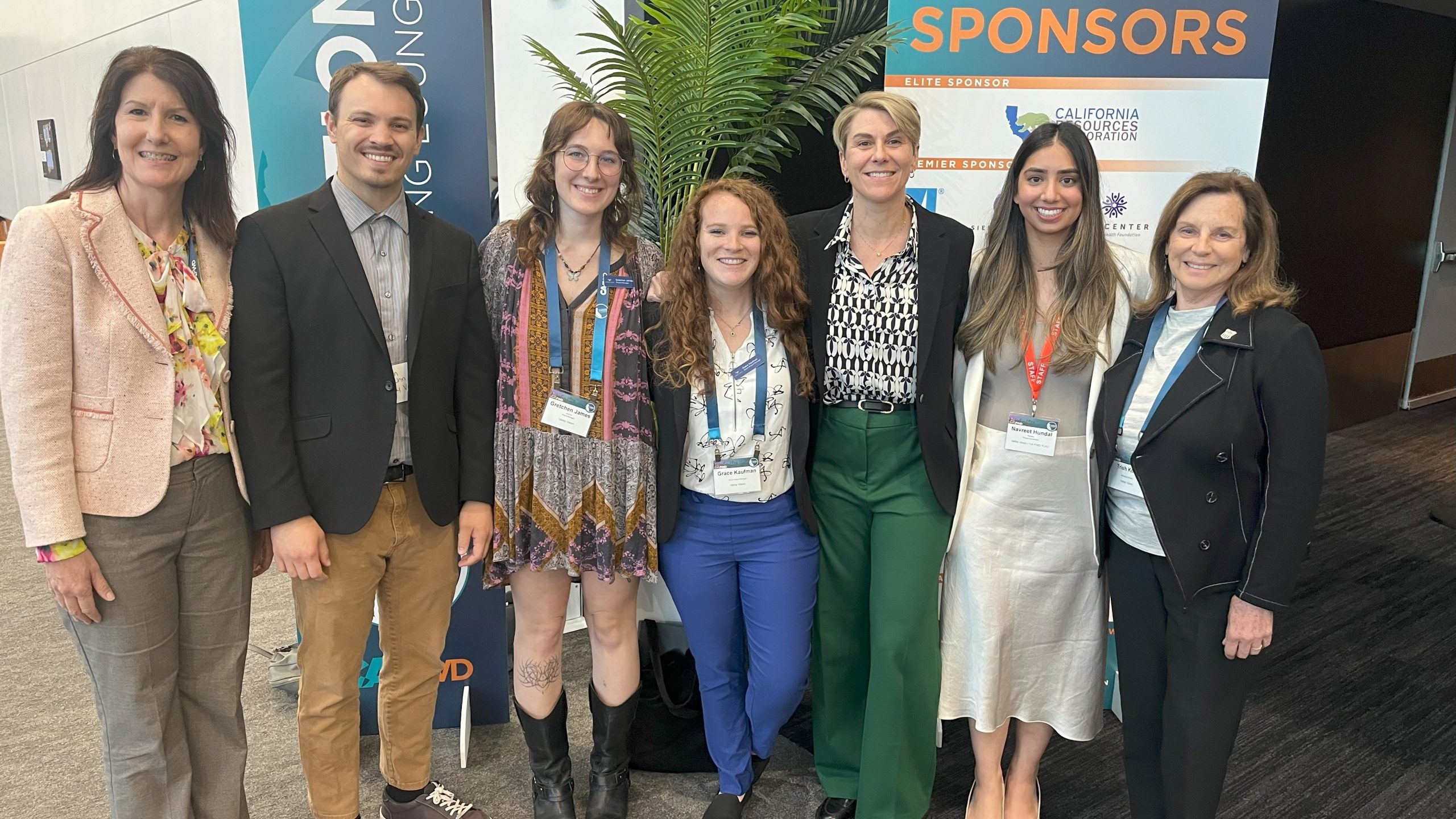
Valley Vision helped co-host this year’s California Economic Summit, organized by California Forward and held for the first time in Sacramento since 2016. Held October 8-10, 2024, the latest iteration of the annual Summit proved to be an incredible showcase for the Sacramento region’s leadership on inclusive economic development, workforce, innovation, and more.
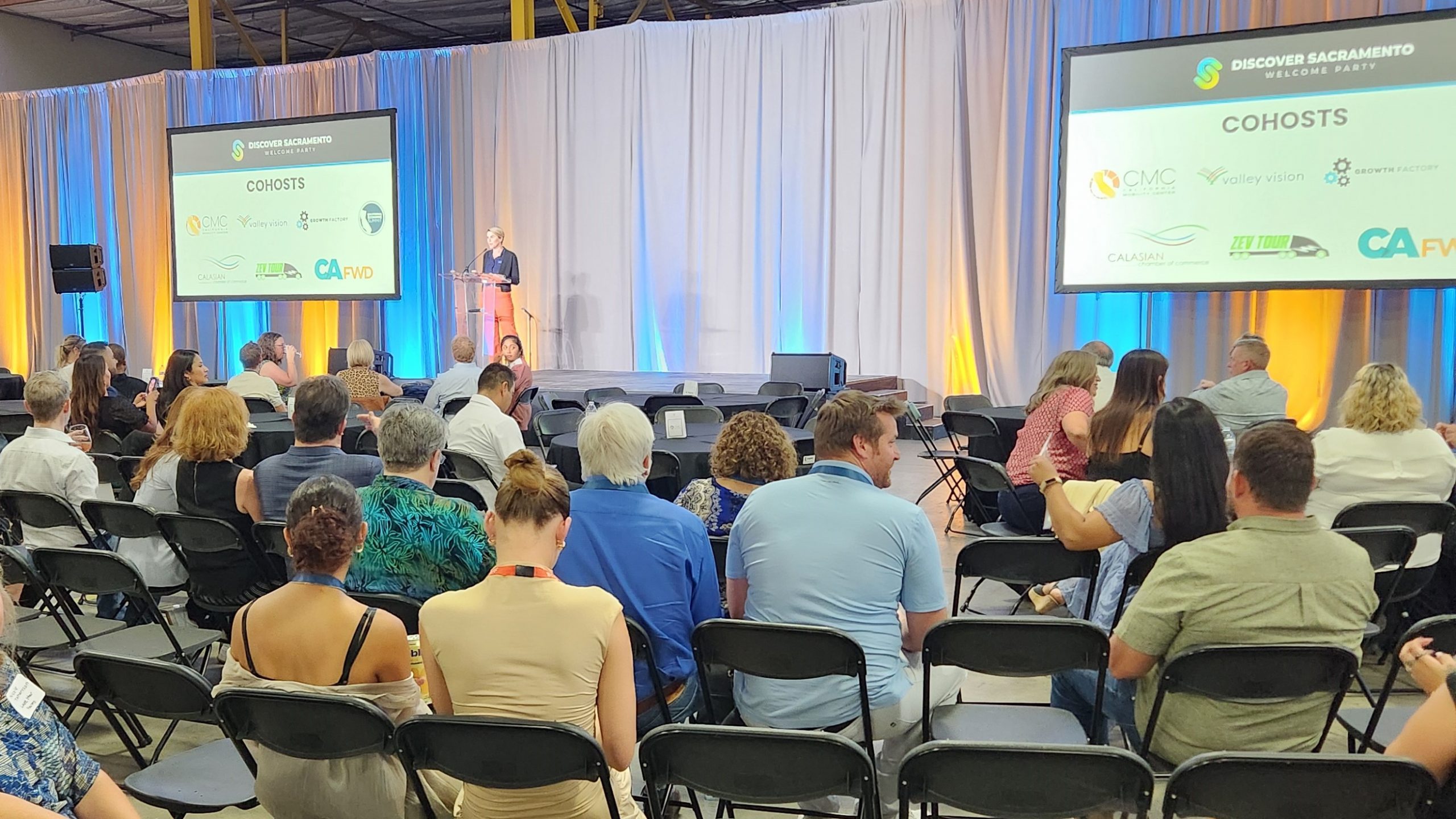
Valley Vision organized a set of regional tours on the first day of the Summit, which gave participants an on-the-ground perspective of how local communities are tackling some of our biggest economic and environmental challenges. By showcasing everything from sustainable food systems to novel workforce training programs, these tours highlighted the solutions that are helping to build a more resilient, inclusive future for California. See below for photos highlighting the tours:
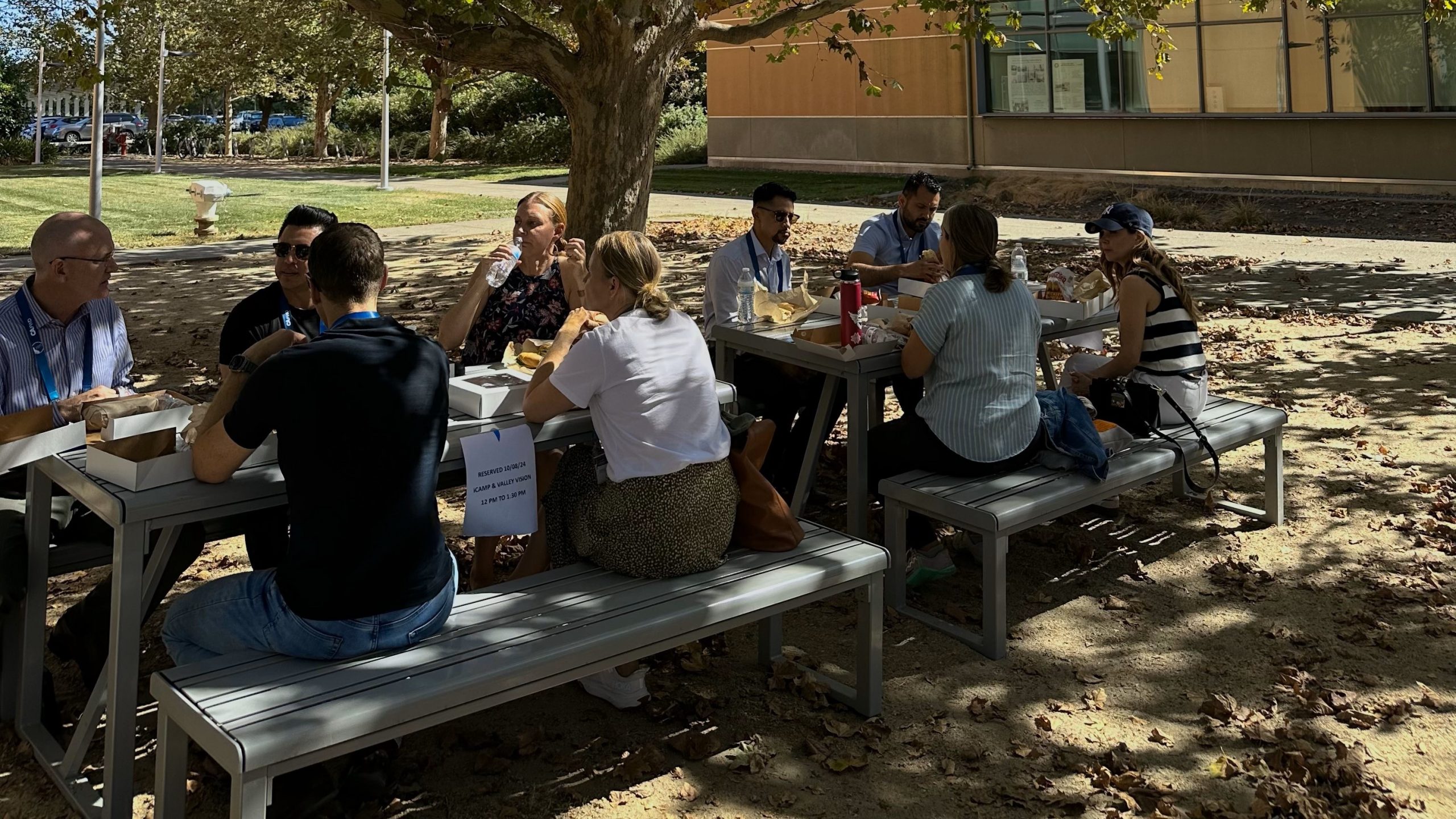
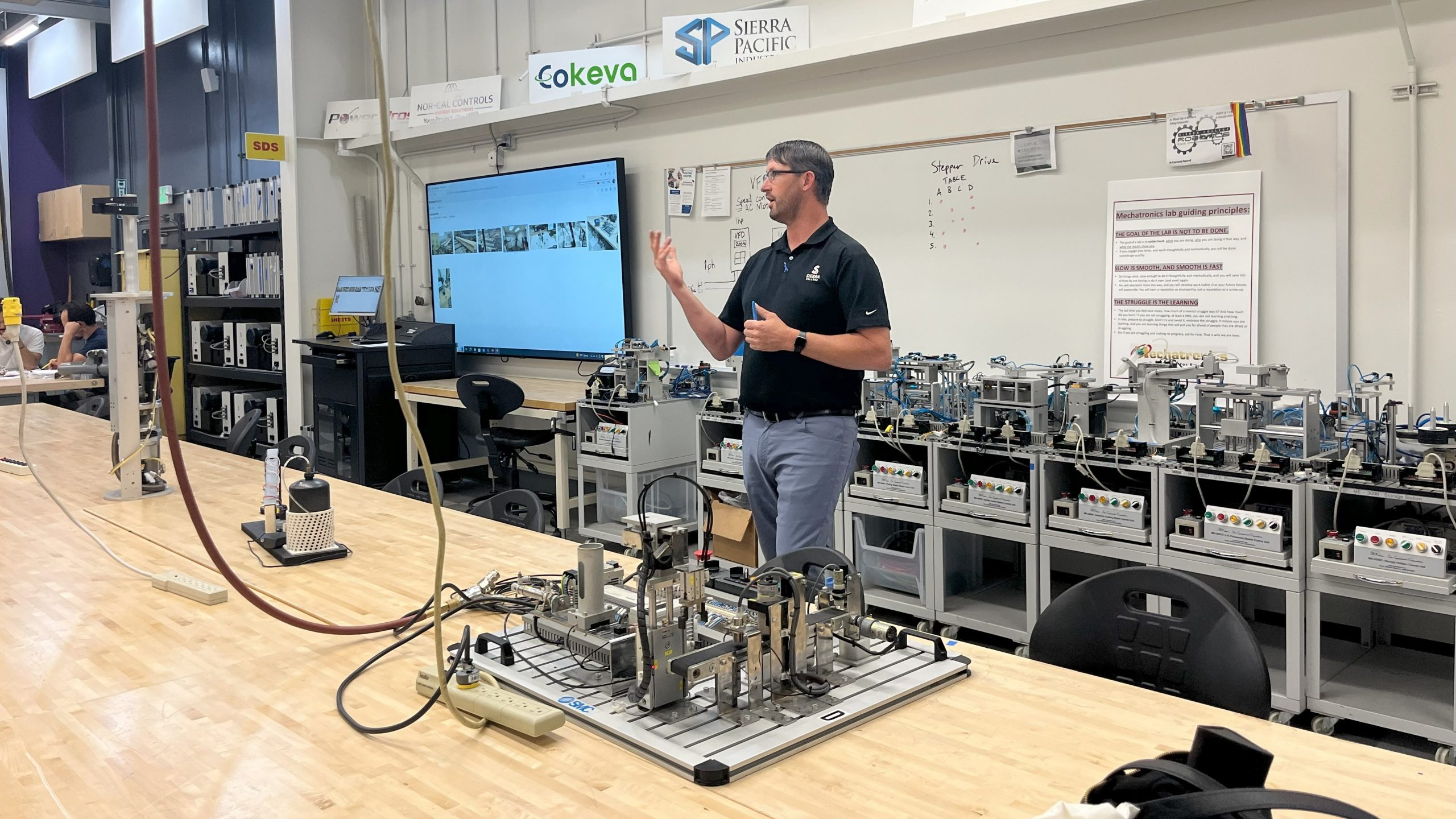
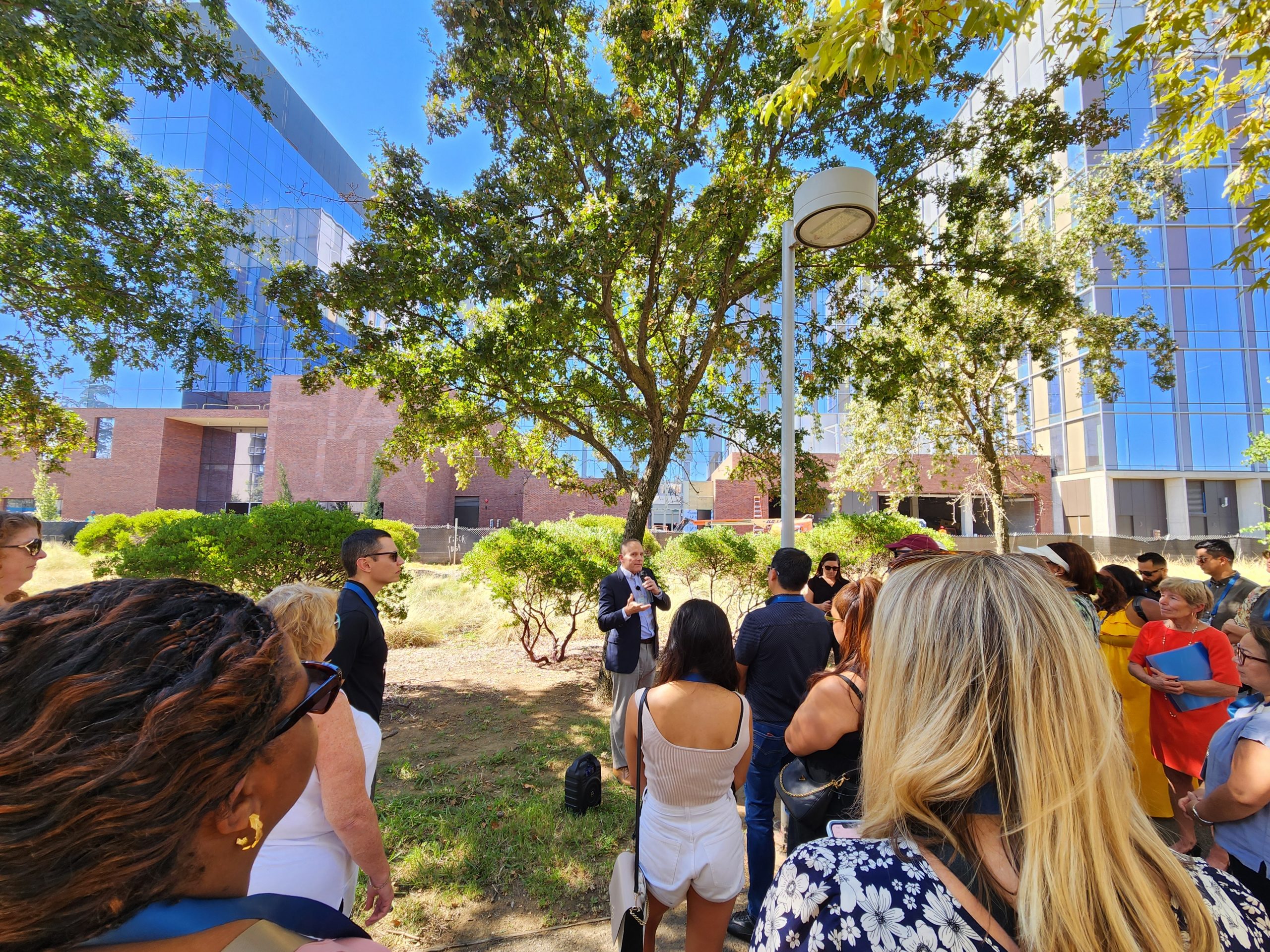
The welcome reception followed the tours, and served as a kickoff for both the California Economic Summit and the Growth Factory’s GFX Summit. In addition to showcasing our region’s topline facility for advancing clean mobility, attendees could taste several gourmet foods created with plant-based, lab grown meat alternatives. Innovative!
The main days of the Summit (October 9 and 10) featured plenary sessions, action-packed workshops, networking events, and more. See below for a few highlights:
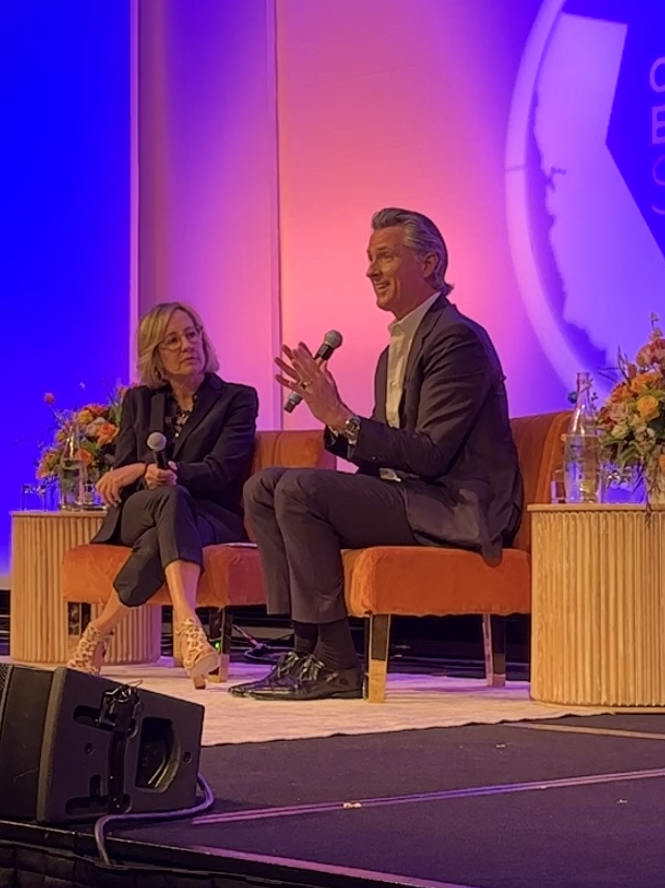
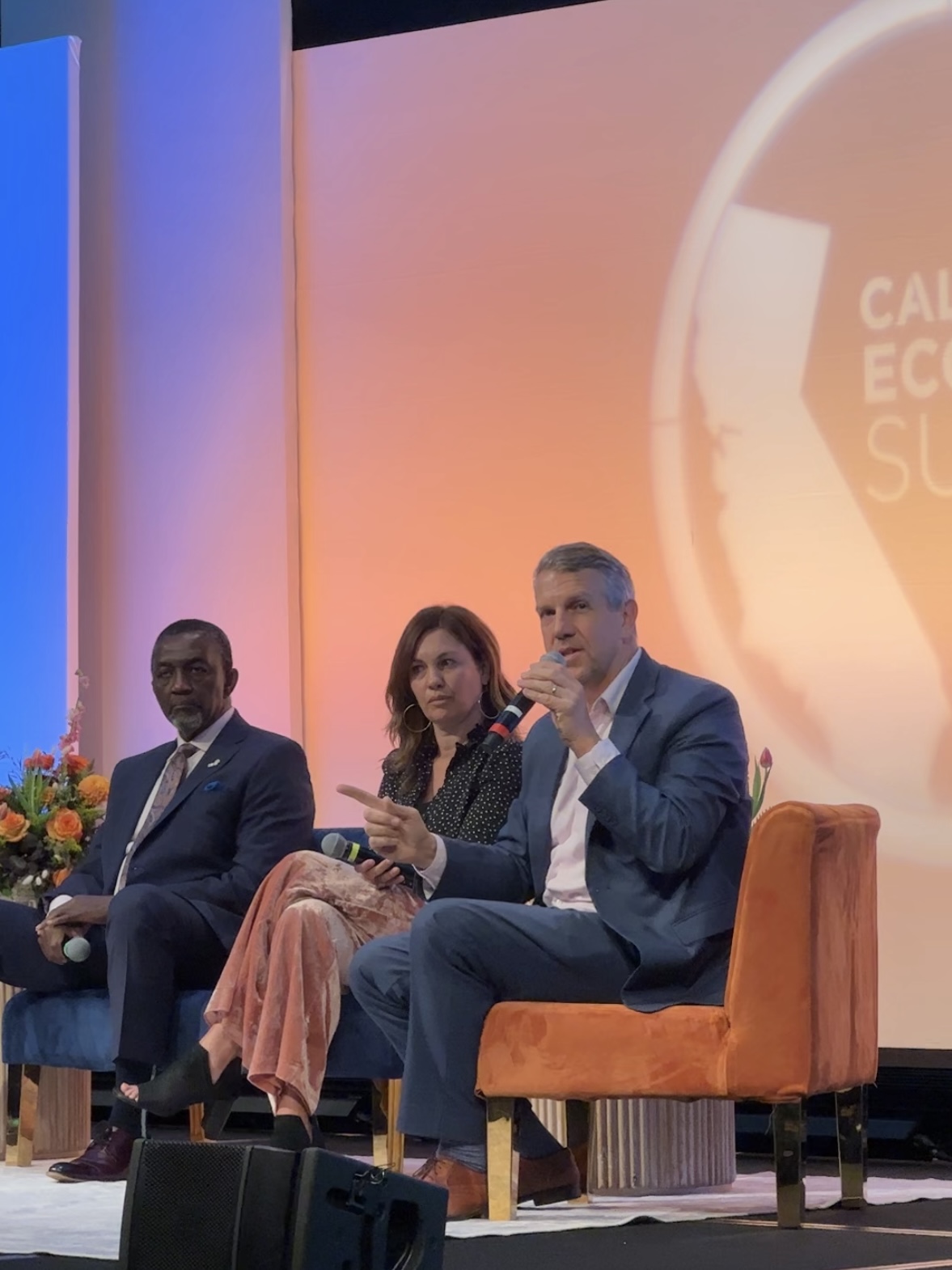
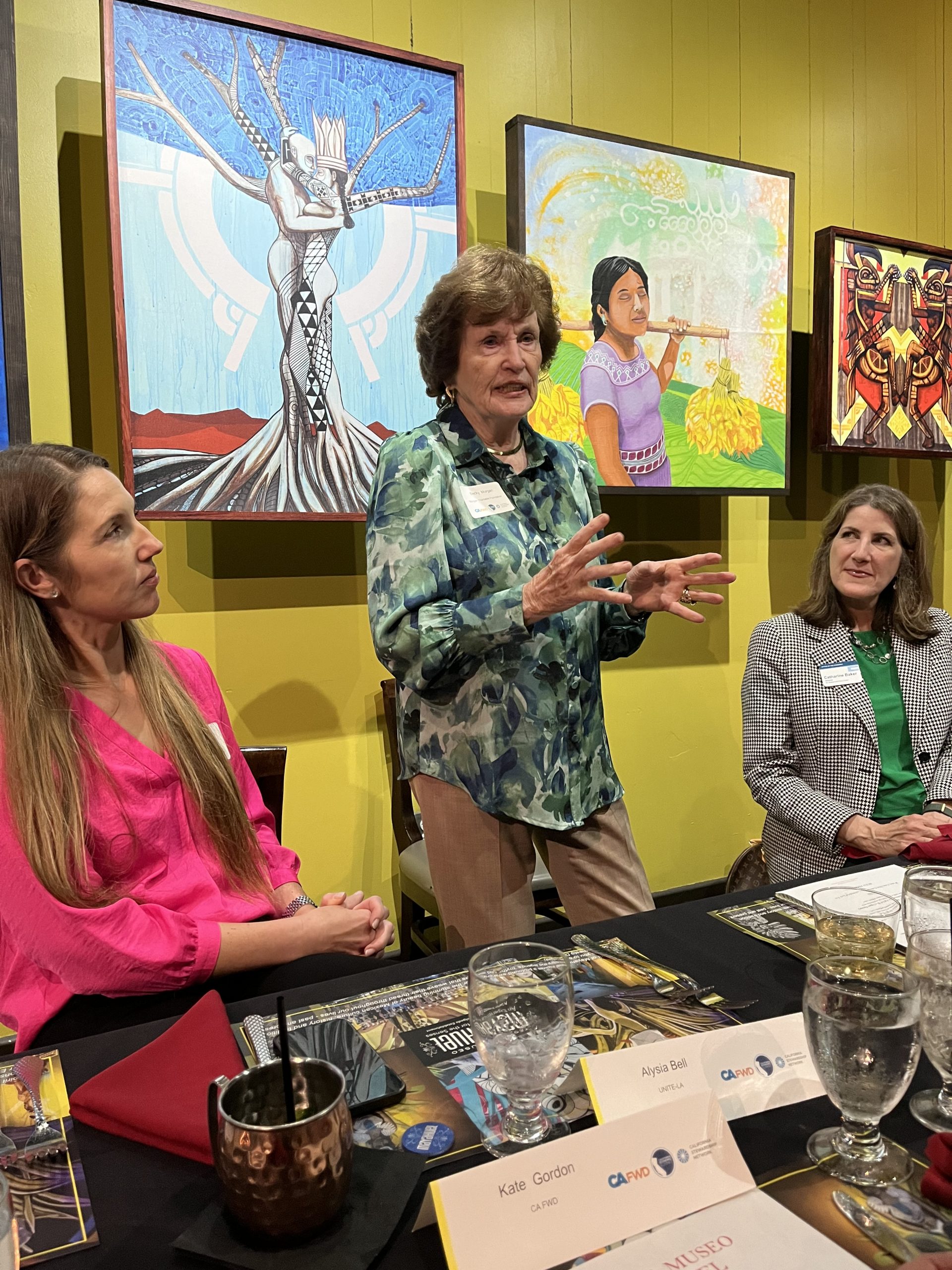
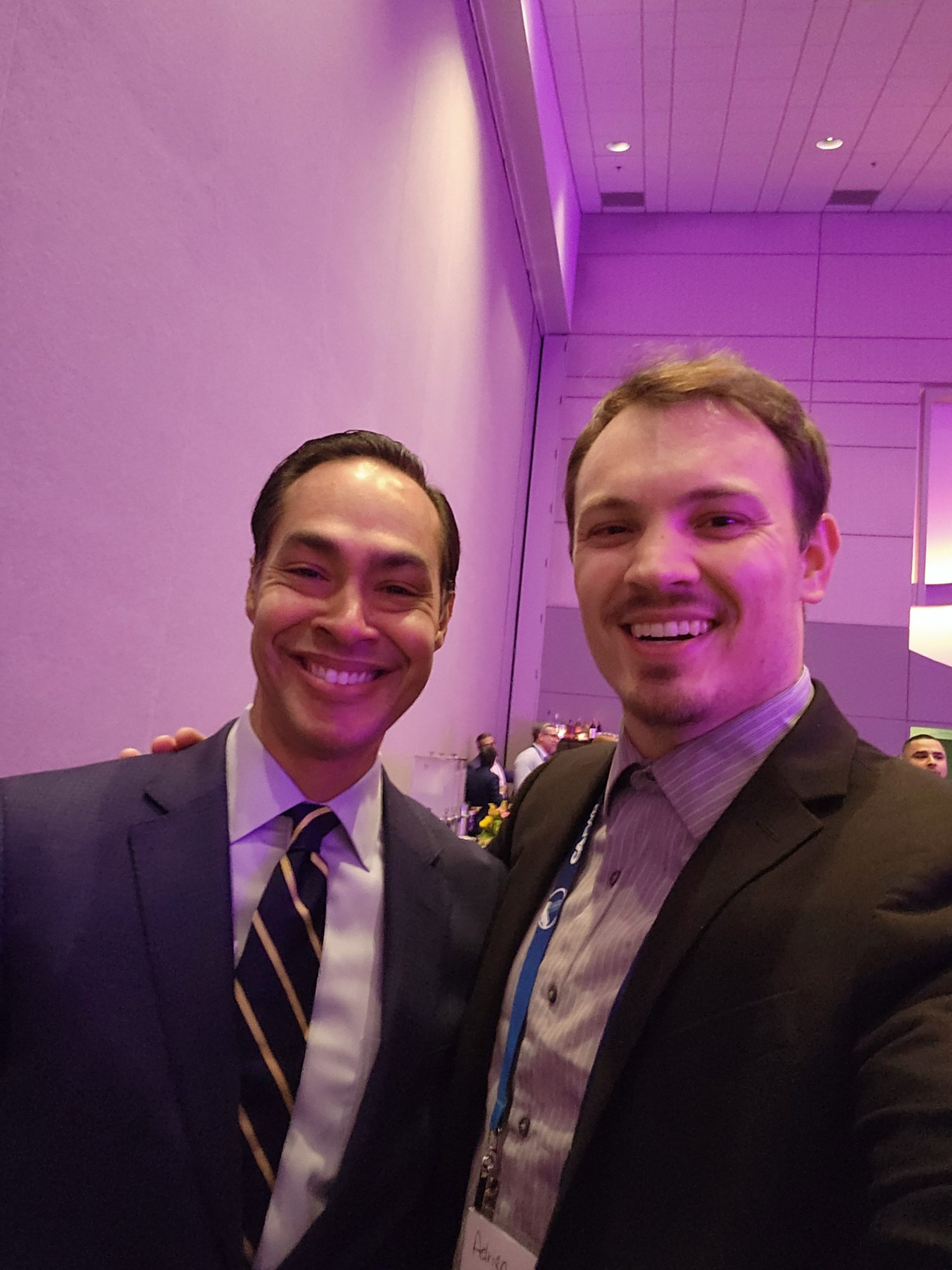
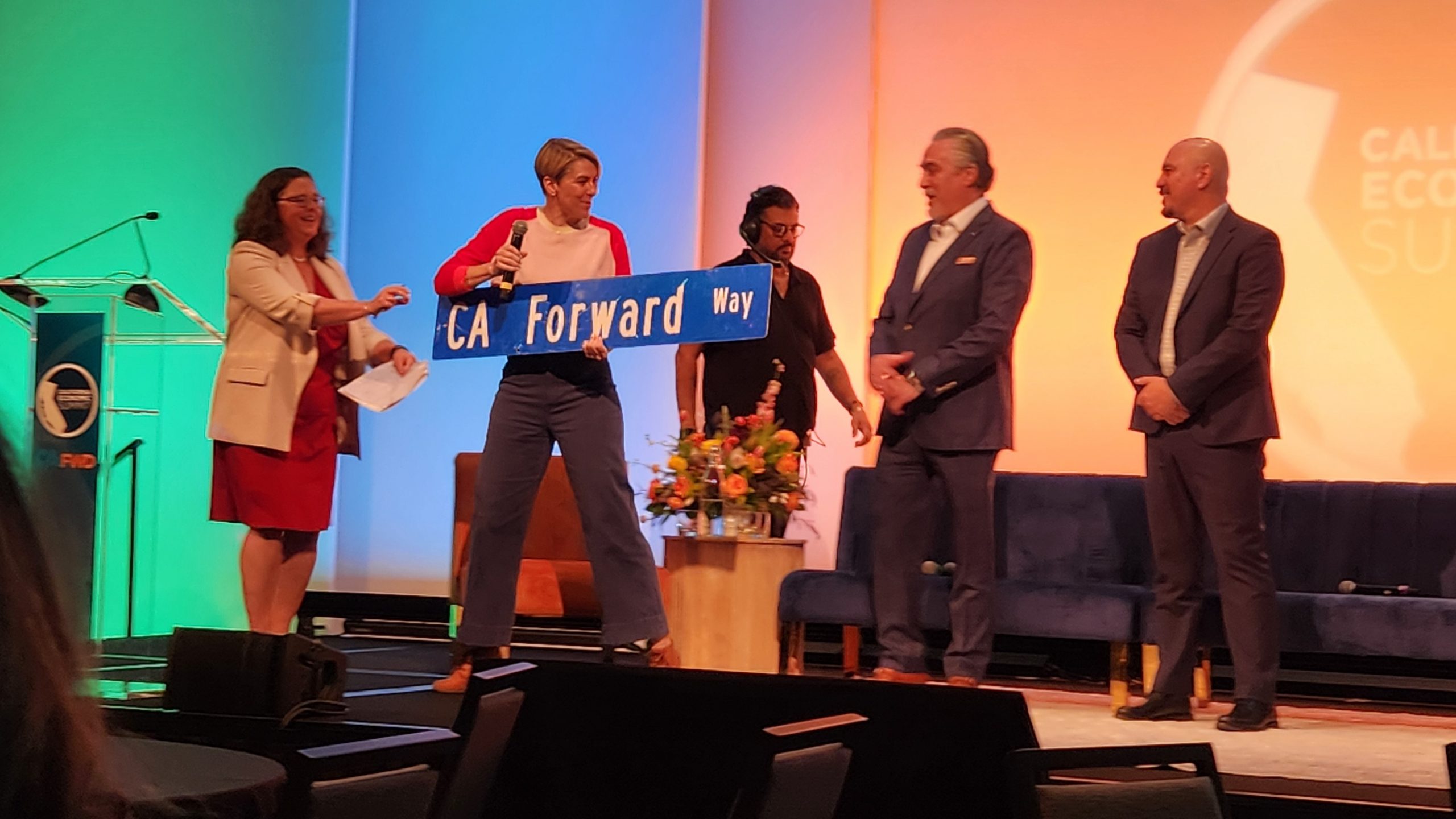
Finally, the Summit ended with a “handoff” from Valley Vision’s Evan Schmidt to leaders in Stockton, California, which is hosting next year’s Summit the week of October 20th, 2025. We wish Stockton the best and look forward to learning how they are building a vibrant economy. Subscribe to California Forward’s email newsletter for more updates! Thank you to California Forward, its staff, and partners for a fantastic showcase of Sacramento.
Adrian Rehn is a Senior Project Manager overseeing air quality and environmental projects as well as Valley Vision’s communications.
Valley Vision Takes On Longstanding Regional Climate Collaborative
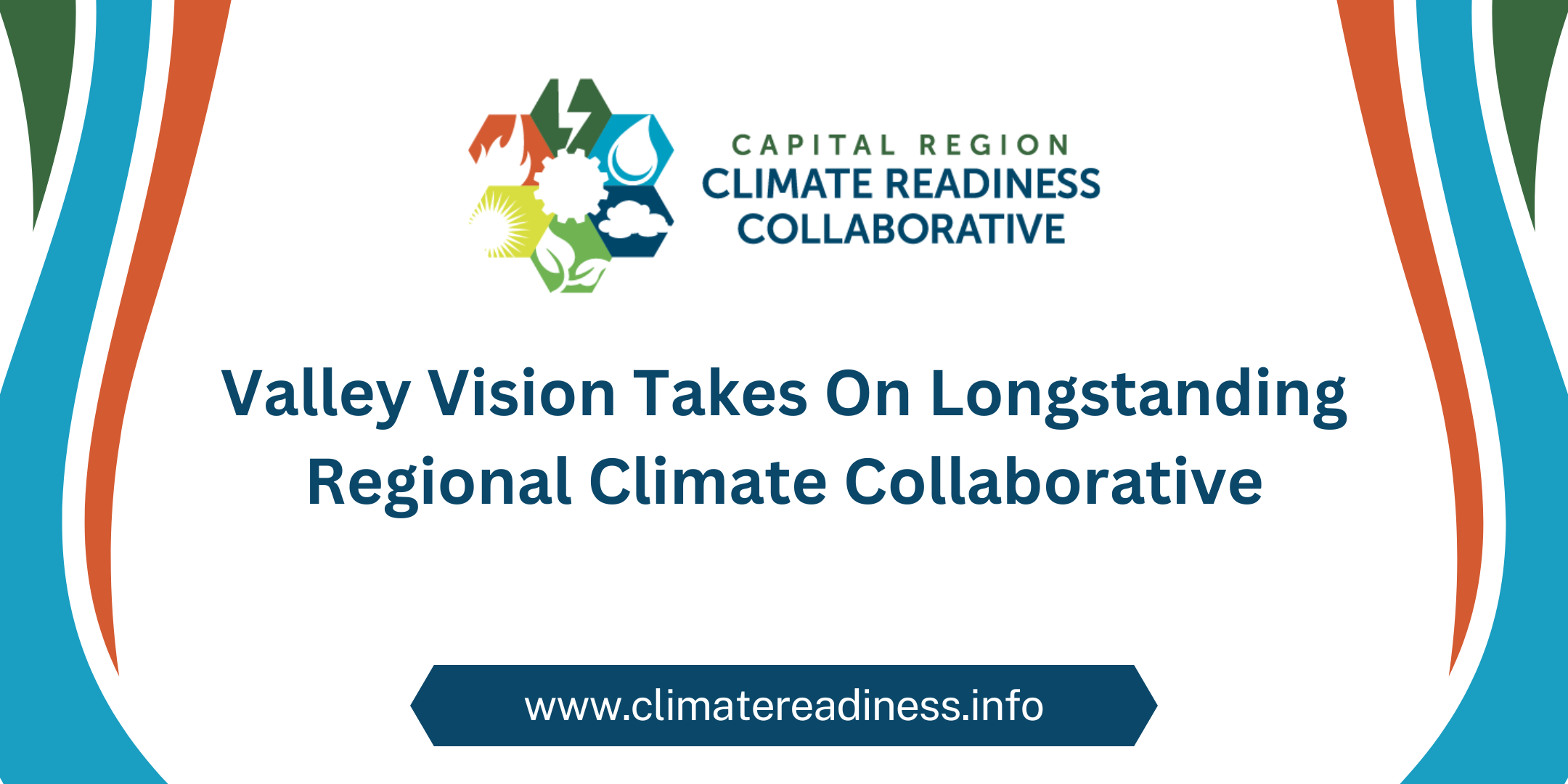
We are thrilled to announce that the Capital Region Climate Readiness Collaborative (CRC) has officially transitioned from CivicWell to Valley Vision. CRC was established in 2014 to improve collaboration and coordination between government, business, and community as it relates to climate change adaptation and mitigation. Valley Vision joined the Collaborative in 2015 and has had leadership roles in the Collaborative since.
This transition marks a new and exciting chapter for CRC, as Valley Vision is already working to advance climate resilience and collaboration in the greater Sacramento region through several programs such as the Cleaner Air Partnership and We Prosper Together, a California Jobs First Initiative.
As CRC’s new home, Valley Vision will continue to facilitate regional conversations to improve coordination and take action on climate adaptation and mitigation. The Capital Region Climate Readiness Collaborative has long been a crucial platform for bringing together a diverse set of stakeholders, including local governments, businesses, nonprofits, and community groups, to address climate challenges facing the region, such as warming air and water temperatures, risk of wildfire, more extreme heat waves, variable precipitation and seasonal shifts, and loss of ecosystem habitat, to name a few. Now, with Valley Vision’s leadership, we are positioned to build on these efforts and bring even greater capacity to support regional resilience and collaboration.
We invite Valley Vision’s partners to learn more about the Capital Region Climate Readiness Collaborative and consider joining the Collaborative as a member. Whether you are a business leader, government agency, academic institution, or community organization, your participation will help strengthen our collective ability to build a climate-resilient future for all.
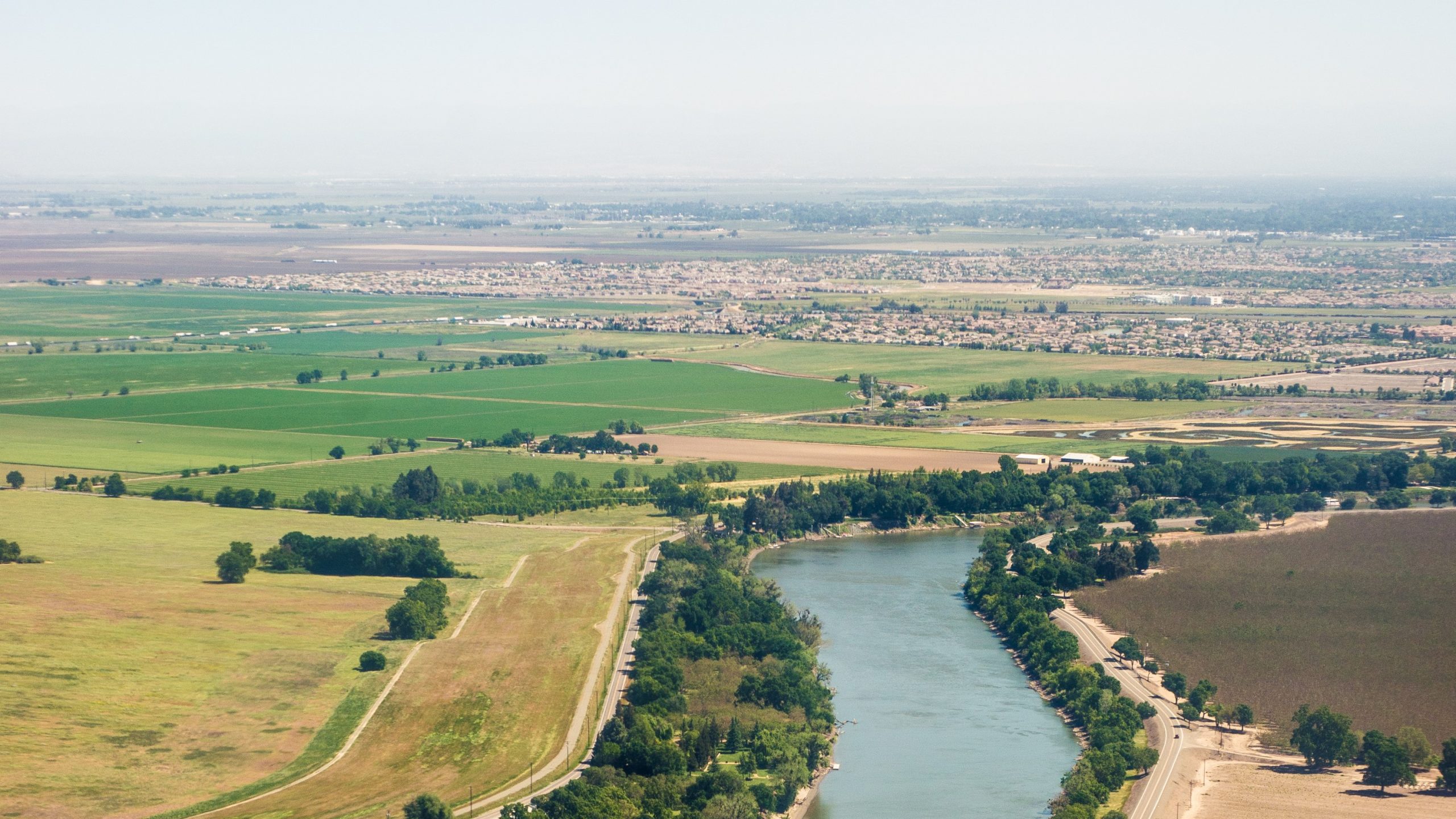
Upcoming Events You Don’t Want to Miss
To kick off this new chapter, we’re excited to host/cohost a series of events designed to engage our community and provide opportunities for learning, networking, and collaboration.
November 20th, 10:30 AM – 2:30 PM, Biomass Workshop, Folsom Community Center
- Join for an in-depth workshop focused on the role of biomass in climate resilience. This event is in collaboration with the Cleaner Air Partnership, the Los Rios Community College District, and CRC. With over 100 attendees expected, this workshop will establish a shared understanding of biomass utilization, explore the future of forest management and agricultural careers in our region, and mobilize leaders and decision-makers for action. It’s an incredible opportunity to connect with regional experts, researchers, and policymakers. Registration link.
December 12, 12:30 PM – 4:00 PM – CRC Members-Only Meeting, Sierra 2 Center – 2791 24th Street, Sacramento CA 95818 (Room 10)
- This meeting, exclusively for CRC members, will feature presentations on the state of climate adaptation in the Capital Region. Attendees will have the opportunity to engage in roundtable discussions, identify collaboration opportunities, and explore how CRC can better support members’ efforts in addressing climate challenges. If you are already a member, this is your chance to help shape the future of climate action in the region. If not, consider joining to be part of this important conversation! Registration link
Join the Capital Region Climate Readiness Collaborative
There has never been a more critical time to take action on climate resilience. CRC is a diverse and growing collaborative, and with Valley Vision’s leadership, we are ready to take CRC’s impact to the next level. We invite you to join us as a member and be part of the solution as we work together to create a more climate-resilient Capital Region.
To learn more about membership opportunities, visit https://climatereadiness.info/about-us/join-the-collaborative or contact Grace.Kaufman@valleyvision.org.
Planting the Seeds of Resilience: Listos California
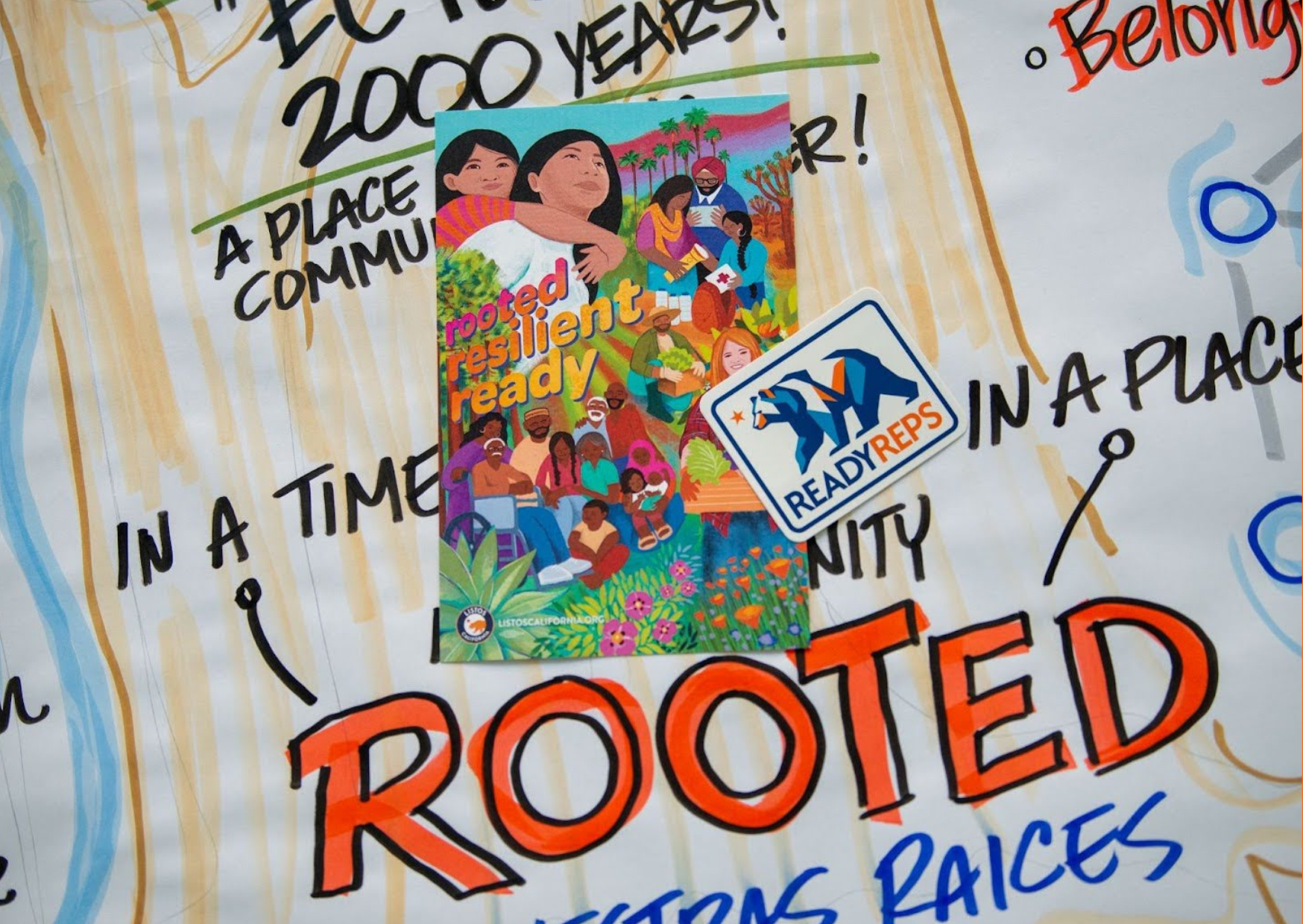
Initiated in 2019, Listos California’s goal is to provide culturally competent materials to all Californians for disaster preparedness, including earthquakes, floods, and wildfires. Utilizing community-based organizations, Tribal governments, and Community Emergency Response Teams (CERTs), Listos Califonia has engaged millions of Californians with low incomes, disabilities, language barriers, older adults, and other highly vulnerable populations with culturally and linguistically appropriate support through a grass-roots, people-centered approach.
Valley Vision has been a key partner to Listos since its inception. Serving as Listos California’s backbone organization, Valley Vision collaborates to coordinate the work of creative, strategic, and programmatic partners to create and distribute culturally appropriate educational resources to Listos California grantees and all California residents. Together, our goal is to empower vulnerable individuals and strengthen community resilience across the state in the face of disasters.
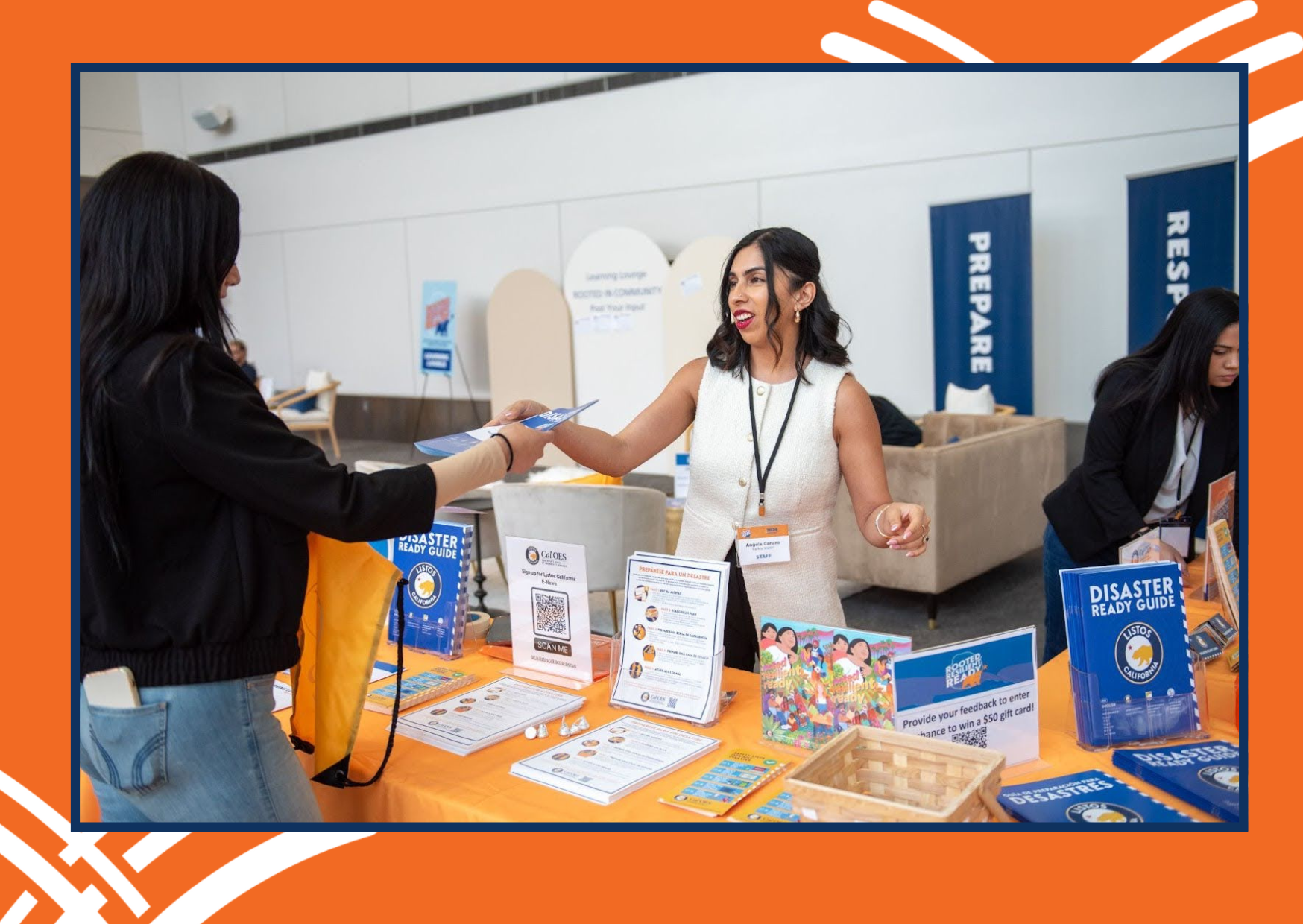
The Office of Community Partnerships and Strategic Communications (OCPSC), like Listos California, recognizes the role that community partners have in reaching at-risk communities to make them resilient in the face of uncertainty. On April 24 through April 26, 2024 in Sacramento, Listos California partnered with the Office of Community Partnerships and Strategic Communications (OCPSC) to jointly host the Rooted. Resilient. Ready. 2024 Statewide Community Partner Convening.
The first-of-its-kind, three-day gathering brought together 600+ trusted CBO messengers from diverse regions of the state, facilitated the exchange of success stories, deepened connections, and shared access to emerging resources.
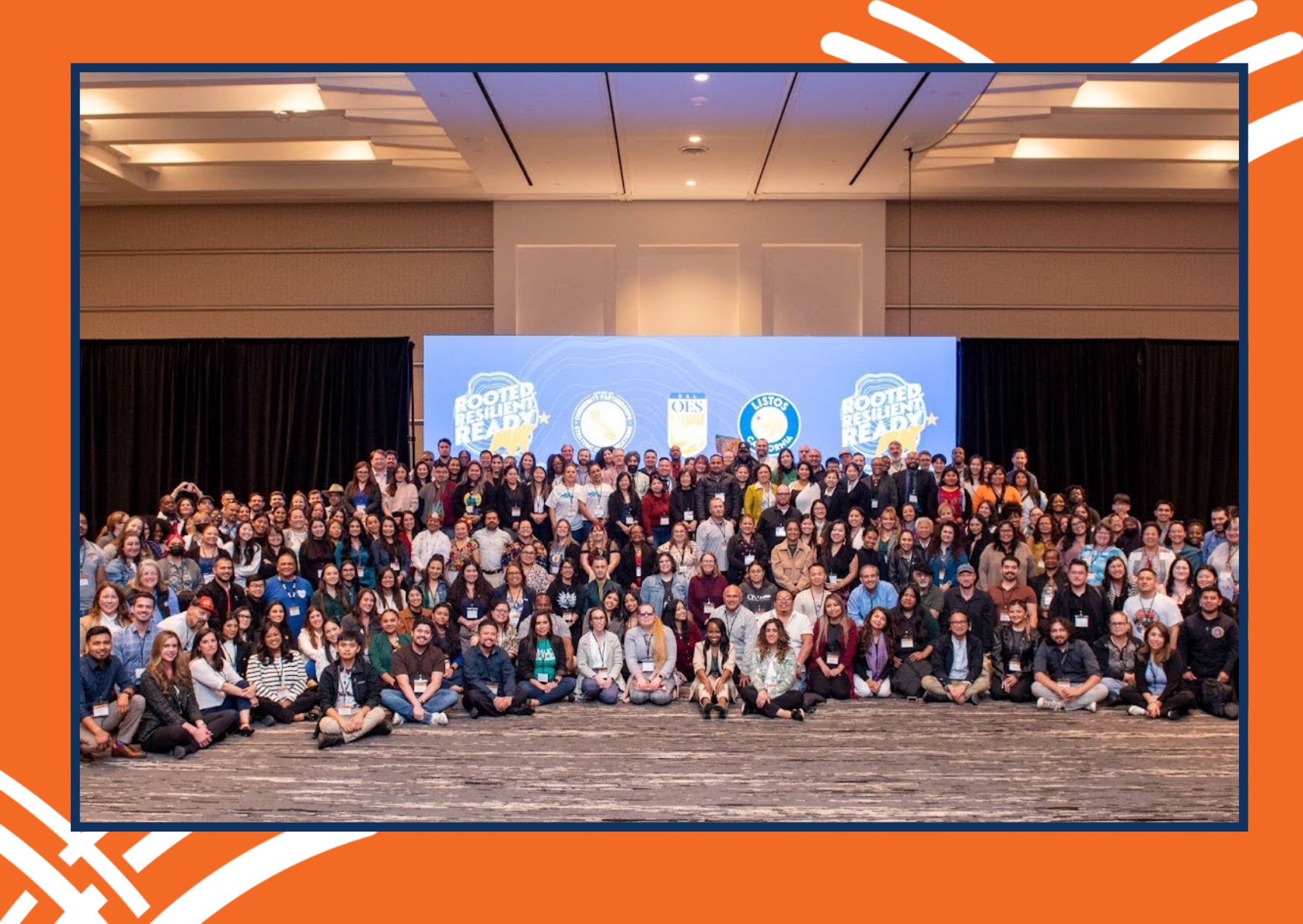
This convening allowed trusted messengers to learn new ways to best communicate emergency resiliency messages to California’s community members most at risk to disasters. Through interactive workshops, participants had the opportunity to collaborate on innovative approaches on grassroots communication strategies and learn about new ways to meet people where they are using culturally competent information.
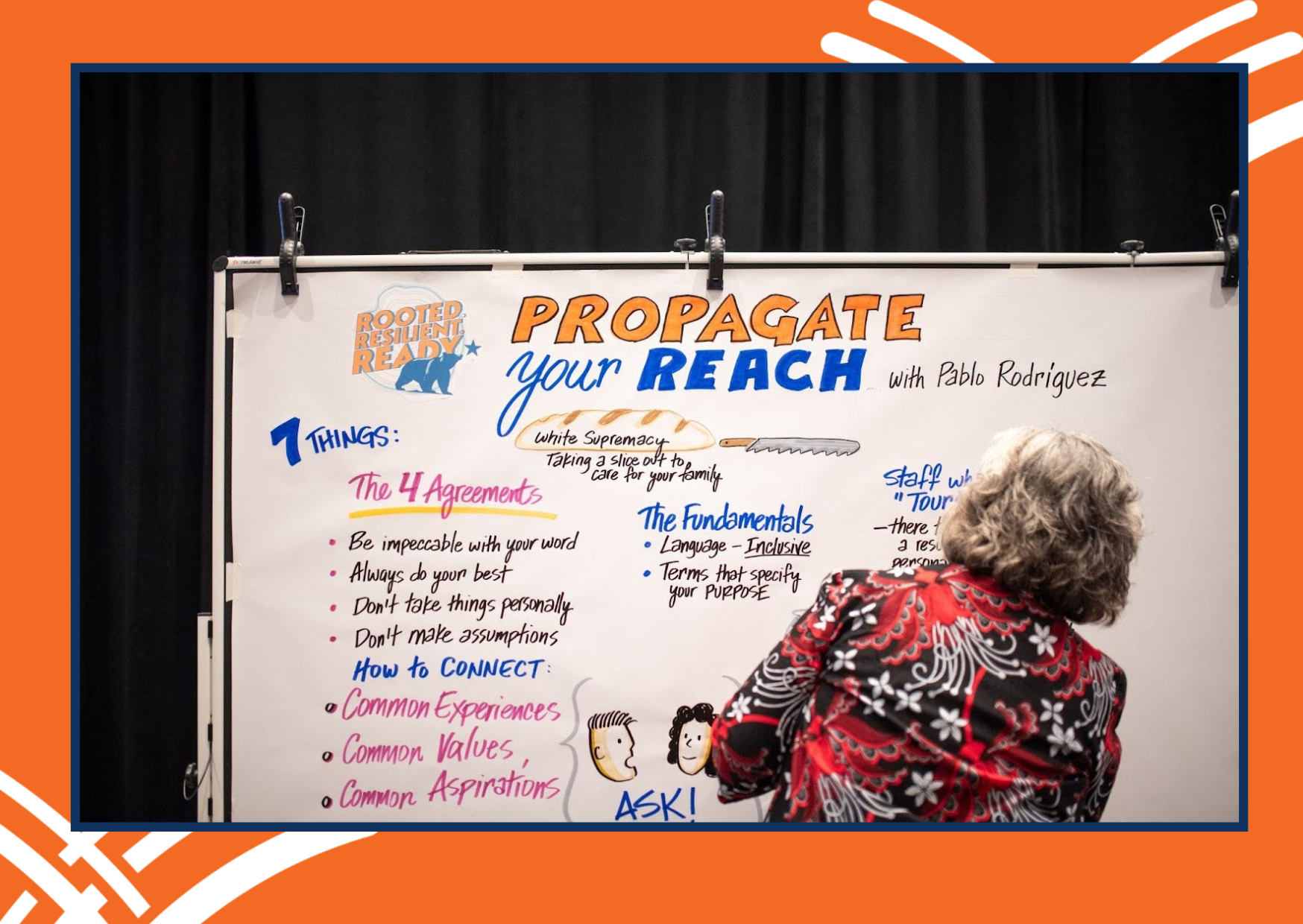
Additionally, participants attended networking sessions to grow their networks of trusted messengers who share critical life-saving information before, during, and after disasters. Anyone who is passionate about informing their community of emergency readiness can become a messenger, including YOU.
Listos California has a suite of in-language resources in over 12 languages available for download and professional printing. Resource topics span over the variety of natural disasters Californians face, mental health awareness, population specific materials and more. Interested in learning simple steps you can take today to keep yourself, your loved ones and neighbors safe? Click here to find out more.
Additional Information
- To view the full list of grantees, along with their service areas and populations served, visit the Listos Atlas.
- For tools and resources developed by Listos California, visit www.listoscalifornia.org
- Join our Movement: Sign up for the Listos California Newsletter to receive news and resources on disaster preparedness, response, and recovery.
- For questions regarding Listos California, email hello@listoscalifornia.org